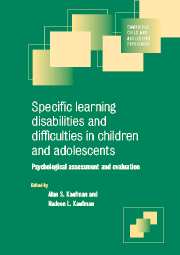 Specific Learning Disabilities and Difficulties in Children and Adolescents
Specific Learning Disabilities and Difficulties in Children and Adolescents Book contents
- Frontmatter
- Contents
- List of contributors
- Preface
- Part I History and Tradition
- Part II Alternative Cognitive Approaches to Learning Disabilities Assessment and Remediation
- Part III Neuropsychological Approaches to Learning Disabilities Assessment and Remediation
- Part IV Integration and Summation
- 13 Assessment of specific learning disabilities in the new millennium: issues, conflicts, and controversies
- Index
13 - Assessment of specific learning disabilities in the new millennium: issues, conflicts, and controversies
from Part IV - Integration and Summation
Published online by Cambridge University Press: 06 January 2010
- Frontmatter
- Contents
- List of contributors
- Preface
- Part I History and Tradition
- Part II Alternative Cognitive Approaches to Learning Disabilities Assessment and Remediation
- Part III Neuropsychological Approaches to Learning Disabilities Assessment and Remediation
- Part IV Integration and Summation
- 13 Assessment of specific learning disabilities in the new millennium: issues, conflicts, and controversies
- Index
Summary
Two fields that have embraced controversy from their inception are intelligence testing and specific learning disabilities. This book, with its focus on the assessment of specific learning disabilities (SLDs), unites the two, providing a double dose of controversy. Indeed, one does not need to look very far to understand that professionals differ dramatically in their perceptions about SLDs — causes, definitions, diagnosis, treatment — and about the role that should be played by IQ tests and other standardized neuropsychological tests during the diagnostic process.
Shepherd's insightful history lesson in Chapter 1, rooted in neurology and special education and always oriented toward a pragmatic, educational perspective, delineates the different roads that have been traveled by the pioneers in the field, and enlightens us as to where these paths have led in the present. Yet other histories of learning disabilities also abound in this book, notably Spreen's neurological history (Chapter 9) that emphasizes theory and research, and stresses SLD subtypes; Reitan and Wolfson's history of SLDs from a neuropsychological research perspective (Chapter 10), in which the emphasis is on discriminating SLD individuals from normal and brain-injured individuals, and on understanding each SLD person's unique neuropsychological profile; and Mather and Woodcock's approach (Chapter 3) that cites the historical precedents for interpreting SLDs in terms of ‘the common theme … that learning disabilities arise from a deficiency in basic cognitive processes, which in turn contribute to academic failure’ (see p. 77).
- Type
- Chapter
- Information
- Specific Learning Disabilities and Difficulties in Children and AdolescentsPsychological Assessment and Evaluation, pp. 433 - 462Publisher: Cambridge University PressPrint publication year: 2001
- 8
- Cited by
